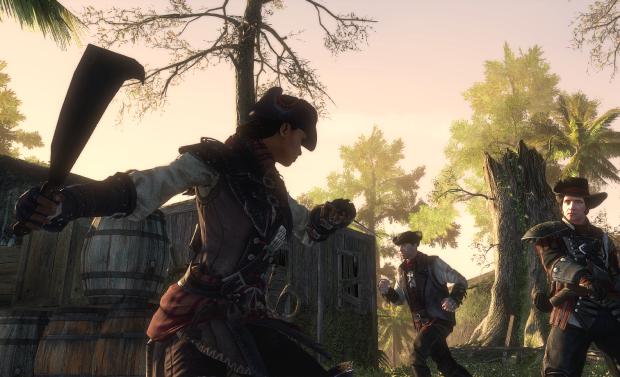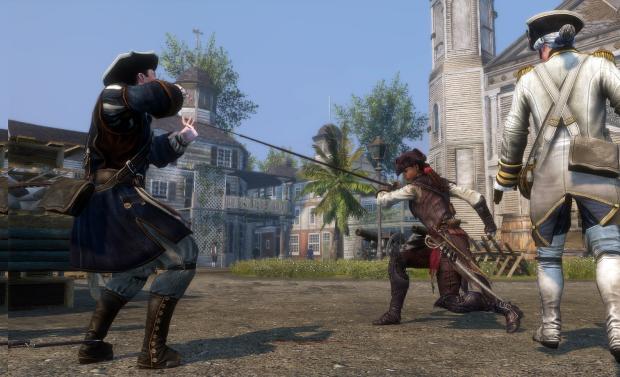It is over a year since Assassin’s Creed Liberation launched on the PS Vita, bringing several firsts for the stealth series. For a start, we’d never seen a full Assassin’s Creed title on a portable device. Yes, there were spin-off games and mini-adventures, but Liberation was the first time that a handheld version of the game felt like a true entry in the series. The second, and more prominent, step that Liberation took was to feature a female Assassin in the lead role. This was a welcome change and offered a new perspective on the Assassins versus Templars conflict.
As you can see in our original review, Liberation was fairly successful – enough to warrant a high definition makeover, at least. Ubisoft Montreal have jumped in to assist with translating the work of Ubisoft Sofia from the PS Vita version into full HD – amongst other improvements and tweaks. There were a few unique elements that were added to the usual mix for the Vita version, along with a few complaints – so how has the transition to home consoles affected these issues?

Unlike previous Assassin games, the plot doesn’t concern Desmond Miles in the modern day; instead it is played as if the Animus is open to consumers who can jump into history for pleasure and entertainment. The storyline – for those who didn’t play the game first time around – follows Aveline De Grandpre, a French-African girl in 1757 New Orleans. We join her in her youth for a brief scene where she loses her mother in a crowd, and is grabbed by the town guards. The game then quickly fast-forwards to Aveline as a young lady, and she now lives in a wealthy home with her father and step-mother – and is inexplicably an Assassin.
The story is only minutes in and already confusion is reigning supreme. The Vita version was accused of not explaining the backstory very well, and despite the claims that the HD iteration would help clear this up, issues still remain. If you dig a little, you can delve into the character profiles and database, where you can learn that Aveline’s mother abandoned her after she was born, but this is all glossed over in-game. There are even some sub-plot elements, where a hacker tries to reveal the truth behind Abstergo, but this is somewhat wasted in a game that fails to coherently present a central narrative.
This HD version adds some extra backstory pop-ups during loading screens, which do help explain matters more, but the plot still jumps between points in the timeline too often without any explanation. Ubisoft have also added in another fifteen missions, most of which are there to add a little more exposition and to aid in transitions in the story. The sad fact is that even with these the plot is obscure and hard to follow. Despite these issues, Liberation manages to re-focus on its stealth roots, after Revelations and Assassin’s Creed III sometimes felt like stealth had been put on the back-burner. Liberation actually brings the idea of being a silent assassin back to the fold – which is definitely welcome.
Possibly the most successful element is the idea of Personas – this is the one thing that is most distinct about Liberation and sets it apart when compared to earlier Assassin’s Creed games. By accessing changing rooms throughout the game (which can be re-built and bought as you progress, in order to provide more), you can choose whether Aveline dresses as an Assassin, a Slave or a Lady. Each allows you different skills, such as lower notoriety as a Lady whilst being unable to jump, or the ability to blend in more easily when playing as a Slave. Although most missions will force you to change, or tell you that you should, this mechanic does allow players to tackle some missions in their own way, and it at least creates the illusion of variety.
One of the main differences in the HD version is the removal or alteration of Vita-specific elements. For instance, the touch screens and rear touch of the Vita could be used to pickpocket targets or open envelopes – elements which were pretty superfluous in reality, and are now handled simply with button presses as in every regular Assassin’s Creed game. These were always more frustrating than they were helpful in the PS Vita release, so they certainly aren’t missed in this one. Canoes make water-based navigation a lot less painful than simple swimming, and it seems weird that a feature like this has never been included in Assassin’s Creed in the past – especially when the series has been to Venice!
Unfortunately, there was an interesting chain kill feature in the Vita version, which let you tap on enemies to tag them before executing them, and this has actually been kept for the HD remake, but assigned to the right stick and buttons instead. The idea of tagging enemies was an interesting gimmick, but with the touch control removed it becomes a bit of a pointless exercise. There was also a Risk-like multiplayer mode featured in the handheld version, which was actually very hard to get your head around – and thankfully this has been dropped entirely from this release. In fact, there is no multiplayer at all. This obviously cuts down on the amount of content on offer, but it was such a poor offering in the first place that it is not missed. The main storyline spans eight chapters and could take around ten hours to complete, and when you add optional side-quests and collectables on top, the lack of multilayer won’t be felt.

The final (but most obvious) improvements seen in Liberation HD are the audio-visual elements. The voices and music have both been re-mastered and sound very good in this remake. The music maintains the quality and atmosphere of the main series, and the voice acting is solid, even when it involves a multitude of different accents and languages.
Visually, the re-mastering job has been pulled off very well. The game resembles a similar quality to any of the other console-based Assassin’s Creed games that came before it. Even facial details and textures have been improved; this isn’t just a simple up-scaling. There are a few areas where you can see that the graphics originated on a simpler system, such as in the Bayou where the swamp begins to look a bit bland and textures repeat too often to the point of it being obvious. Overall though, the frame rate is good and the action looks almost as good as its counterparts that were built for high definition from the ground up. There is also much more visual variety than in many other games in the franchise, as the contrast between New Orleans and the swampy Bayou gives the game a unique identity.
VERDICT: Liberation remains a fairly strong entry to the series, that manages to maintain the feel of the main games successfully. Liberation HD has been nicely improved to accommodate high definition graphics and sound, and certainly doesn’t look out of place next to other titles on your home consoles. It ticks all the boxes you expect from Assassin’s Creed, whilst also integrating a few new ideas into the mix that help to make the game stand out as a distinct entity. If you have played a previous Assassin’s Creed title you will be able to pick this up and enjoy it straight away – regardless of the story issues – but gamers who are new to the series may be left a little cold by the lack of coherent plot, and may not be willing to work a little harder to find satisfying answers.

GOOD. A game that scores 7/10 is worthy of note, but unworthy of fanfare. It does many things well, but only a few of them incredibly well and, despite a handful of good qualities, fresh ideas and solid mechanics, it fails to overwhelm.
Review code provided by publisher.






